
 |
|
May 2005 Spotlight on GW’s Women in Leadership The following is a list of some of The George Washington University’s academic and administrative women in leadership. |
|
|||||||||||||||||||||||||||
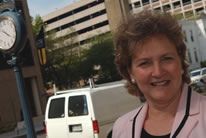 |
Responsibilities: Leading all of the fundraising at the University and for alumni relations. |
|||||||||||||||||||||||||||
| Laurel Price Jones, vice president for advancement Years at GW: Started at GW March 1, 2005 |
||||||||||||||||||||||||||||
 |
Responsibilities: Chief executive officer of the School of Business, general responsibility for academic programs, fiscal responsibility, management and academic leadership establishing the mission, vision, and values of the school. What role has gender played in your career? When I went to the Commodity Futures Trading Commission I was the first female commissioner and the first woman to chair a financial regulatory agency. When I went to the Fed I was the third woman to be a governor of the Federal Reserve System, but while I was there two more women were appointed. Clearly more women are being considered for these senior positions. I was a bit more conscious of it in international settings. I can remember being at a dinner for Central Bankers from Europe. The head of the European Central Bank stood up to open the conversation, and he said, “Gentlemen… and Ms. Phillips.” Allan Greenspan spun around and looked over at me as if to say,“Where did this come from?” Neither he nor I really thought about it, but in Europe you could look around in a room of maybe 50 senior officials, and see that you’re the only woman. |
|||||||||||||||||||||||||||
| Susan Phillips, dean, School of Business Years at GW: 7 |
||||||||||||||||||||||||||||
| Mary Futrell, dean, Graduate School of Education and Human Development Years at GW: 13 Responsibilities: Overall management of operations and maintenance — academic, fiscal, operational, and public relations — of GSEHD. What impact has gender had on your career? It’s been a struggle. I began my career as a teacher and I was very active in the teachers union. As a profession most teachers are women, but when I began to take on more responsibility in the union I was told that many of the positions were for men. When I became secretary and treasurer of the National Education Association I was the first woman and the first minority in that position. I’ve had people question whether I could devote the time and energy necessary, or whether I could be tough enough for the position. Women weren’t expected to be involved in decision making. We could be members of the hospitality committee, but not the government relations or finance committees. |
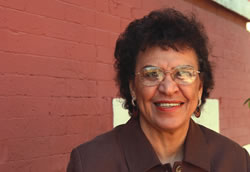 |
|||||||||||||||||||||||||||
| When I became dean we didn’t have three women deans at GW. I was the first female dean of GSEHD. As I look back over the past 10 years, we have more women associate deans, department heads, and tenured faculty. We’re probably the most diverse school on campus in terms of gender as well as culturally. | ||||||||||||||||||||||||||||
 |
Our overall goal is to do everything possible to make that happen. Towards that end, we are taking a number of important steps, including: recruiting first-class department chairs and faculty; growing our research enterprise; creating partnerships with surrounding public health departments, including those located in Maryland and Virginia as well as in the District; establishing new, cutting-edge academic programs; identifying fund-raising opportunities, particularly those focused on student scholarships; and, enhancing our communications tools used within SPHHS and with prospective students, alumni, and potential funders. The key ingredient to bring all of this together is a home of our own. Currently, SPHHS is spread out among six different locations. One of our very highest priorities is having our own space on the Medical Center campus. | |||||||||||||||||||||||||||
| Ruth J. Katz, dean, School of Public Health and Health Services, and Walter G. Ross Professor of Health Policy Years at GW: One and a half Responsibilities: Managing seven academic departments, managing a multi-million dollar budget (including significant research portfolio), developing alumni relations, leading fundraising efforts, and serving as chief SPHHS cheerleader.What goals are you working towards in your position? As we approach our 10th anniversary, I believe SPHHS is poised to become one of the best schools of public health in the country. |
||||||||||||||||||||||||||||
| Linda Donnels, associate vice president for Student and Academic Support Services, and dean of students Years at GW: 26 Responsibilities: Serves as an advocate for nonacademic student matters — student issues such as student rights, civil rights, behavior laws. Manages student services departments. Oversees student housing system, chief non-academic discipline, and member of the University Senior Crisis Response Emergency Management team. What do you find most satisfying about your job? I enjoy working with today’s student issues, the issues that complement the student’s academic pursuit. It’s not just the student in the classroom, it’s the student living with us. I enjoy seeing the evolution of young people who come to school excited, with all sorts of dreams and aspirations. They experience the ups and downs of learning how to be a responsible adult, and then the person emerges. I enjoy seeing that maturation process. I’m not sure there is any other place where people transform so dramatically, changing from children into adults. |
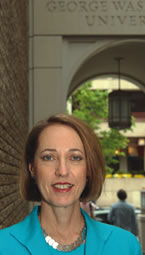 |
|||||||||||||||||||||||||||
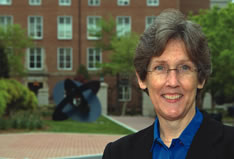 |
summer, international programs, and special programs, the Honors Program, undergraduate fellowships.What gives you the most satisfaction in your position? I got the most gratification from starting the Gamov Undergraduate Research Fellowship Program. It’s just gratifying to be able to give money to very bright students and see them become experts at the field of research they have chosen. I think we have had a lot of positive outcomes from the programs, we have tangible results which you don’t always have in administrative jobs. These students publish papers and go to conferences and present papers and they win fellowships. You can see some good outcomes. I believe in integrating research and education. |
|||||||||||||||||||||||||||
| Carol Sigelman, associate vice president for graduate studies and academic affairs Years at GW: 13 Responsibilities: Graduate studies, which |
||||||||||||||||||||||||||||
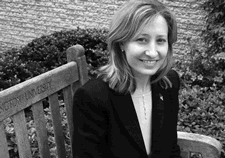 |
What do you find most satisfying about your job? I don’t think I would be happy working in an endeavor whose sole mission was to make a profit manufacturing widgets. Some people might find pleasure in that, but it just wouldn’t be fulfilling for me. Service to the community and wider world is important to me, and I believe education plays a fundamental role in that equation. It’s all about the mission. What do you find most challenging about your job? When you have people at an institution all trying to accomplish a goal, you have to make sure that everybody is growing and learning and rowing in the same direction. Sometimes that’s very challenging, especially the rowing part. You don’t work around it, you work with it. I try to listen and I try to look to people’s strengths and align their functions with their strong points because that makes the whole organization stronger. |
|||||||||||||||||||||||||||
| Eve Dubrow, associate vice president for operations Years At GW: 8 Responsibilities: Manages Strategic Partnerships; Auxiliary Services; Parking, Dining, and Retail Services; GWorld Card Program; Institutional and Investment Real Estate; and Facilities — Operations and Maintenance; Residential Property Management; Planning and Design; and Construction. |
||||||||||||||||||||||||||||
| Susan Kaplan, associate vice president for human resources Years at GW: 17 Responsibilities: Oversee Human Resource Services, the Office of Equal Employment Opportunity, and employee training and development. What do you consider your biggest accomplishment at GW? Two things. One, when people discovered that the president and I were both lawyers, they began asking us for legal advice to assist them in their work. We began to increase the availability of legal assistance, which has become institutionalized under Vice President and General Counsel Dennis Blumer. This has resulted in decisions made with a broader understanding of their implications and, therefore, has improved the quality of those decisions. Second is still a work in progress. I would like to improve the delivery of human resource services and increase the participation of the human resource units in GW’s business decisions. Increased automation of some of these services has begun that process and we are continuing to move forward on several fronts. |
 |
|||||||||||||||||||||||||||
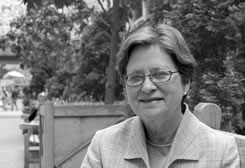 |
What obstacles have you had to overcome to get where you are in your career? When I started my career, being a woman was real negative. I started in journalism in the late 1960s, I had an internship where there had never been any women before. I worked on a sports desk of a newspaper where there had never been any women before. I was the first full-time woman in the journalism faculty at GW. I think it’s much less of an issue for women than it was in the ’60s, ’70s, and even the early ’80s. When I first started teaching, my friends and I who had small children, if we had a meeting we would do anything to cover for the other woman so we didn’t have to say, “Well, I can’t go to the meeting because I have to pick up my child.” That would have been unacceptable. Now, if you have young guys on the faculty and they say, “Oh, I can’t make that meeting. I have to go pick up my child from daycare,” everybody says, “Isn’t he a wonderful father.” I think that really shows how the workplace has changed for the better. It took women making it in the workplace and men taking a greater role at home for the two sides to come together. | |||||||||||||||||||||||||||
| Jean Folkerts, associate vice president for special academic initiatives Years at GW: 15 Responsibilities: Oversaw the honors program, summer sessions, and special academic initiatives, and directed a committee exploring ways to expand GW’s involvement in education in the Mideast. (Folkerts recently stepped down from her administrative post. She plans to go on sabbatical for a year after which she will return to the classroom to teach.) |
||||||||||||||||||||||||||||
| Jill Kasle, University marshal, associate professor of public policy and public administration Years at GW: 24 Responsibilities: Professor in the School of Public Policy and Public Administration teaching law courses in the honors program. As University Marshal shares responsibilities for producing the University’s events. When you began your career, would it have been possible for a woman to advance to a position of your current level? I went to law school in 1969. In my class at law school there were 350 of us, and of those about 340 were men. In those days there was an idea that women shouldn’t be in law. In 1972 women were becoming professors, but it was much less conceivable for a woman to become a University Marshal. The position has traditionally been a man’s job since the 1500s. When I accepted President Trachtenberg’s offer I became GW’s first female Marshal. What about your personality would people at GW least expect? My student helpers run my life; run my schedule; pay my bills; they even make my dates. They can tell you more about me than I can. They interview my dates before I go out with them. They don’t chaperone me, but I think they would like to. |
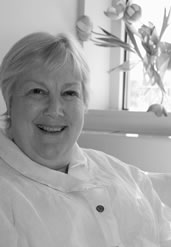 |
|||||||||||||||||||||||||||
| Helen Cannaday-Saulney, assistant vice president, Student Academic Support ServicesYears at GW: 20 Responsibilities: Oversee the Marvin Center University Conferences; licensing and trademark issues; Student Activities Center — Greek Affairs, Office of Community Service; Colonial Inauguration, outdoor education, the GW Summer Tour; Multicultural Student Services Center; and the Stephen Joel Trachtenberg Scholars Program. What obstacles have you had to overcome to get where you are in your career? In some respects I would say location. I have a very strong family presence here in Washington, DC. While I have moved and come back, I’ve always wanted to stay in the city. I’ve been very fortunate that GW has been very good to me, and I think I’ve been very good to GW, but to really move in higher education, to really advance in certain fields, you have to be willing to move. While being an assistant vice president at a school like GW is one of the highest honors that I’ve earned, it is also one that might have happened sooner had I been willing to move. |
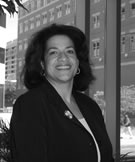 |
|||||||||||||||||||||||||||
| Rachelle Heller, associate dean for academic affairs, Mount Vernon Campus, professor of computer scienceYears at GW: 20 Responsibilities: Concerned with all aspects of teaching and learning at the Mount Vernon Campus, directs the Women’s Leadership Program, works as outreach to the Mount Vernon Alumni, teaches computer science courses on networking and directs computer science graduate students in researching educational uses of computers. What are goals are you working towards in your position? My goal has always been to promote women in careers of science and engineering. This field has provided me with wonderful opportunities and I have wanted others to enjoy them as well. But this goal has become a mission with me as I look around and see that the United States is in serious trouble and is not producing enough scientists and engineers for us to maintain our world leadership. Recently the president of Intel said he could supply all the engineers he needed without relying on the US for workers! This is the most serious concern I have heard to date — it means not only have we lost our manufacturing jobs, we are losing our intellectual capital. |
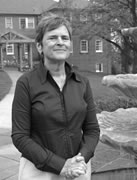 |
|||||||||||||||||||||||||||
| Kathryn Newcomer, director, School of Public Policy and Public Administration, professor of public policy and public administration Years at GW: 24 Responsibilities: Leading a school with three graduate degree programs and more than 250 students, about 30 faculty members, three and a half staff members, and seven graduate assistants; teaching two to five courses a year. What do you consider your biggest accomplishment at GW? Being respected and elected by my faculty peers to administer our degree program and now our school and helping to make a community of faculty, staff and students out of graduate degree programs where many students work full-time and leading our program to become ranked 10th in the country out of more than 240 programs in our field. |
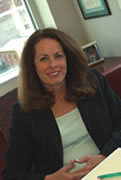 |
|||||||||||||||||||||||||||
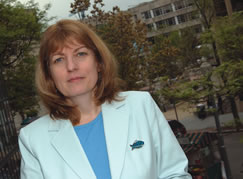 |
smooth out any problems faculty encounter when conducting research, increase outside funding, and improve facilities.Also responsible for new faculty recruitment members and preparation of faculty reviews. |
|||||||||||||||||||||||||||
| Diana L. Lipscomb, associate dean for faculty and research, CCAS Years at GW: 21 Responsibilities: Oversee issues relating to research: increase research activities on campus, |
||||||||||||||||||||||||||||
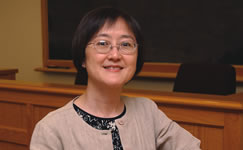 |
What do you find most satisfying about your job? Working with the law students in a hands-on learning environment. They really blossom as young professionals using their legal training and skills to assist individuals in our area. What obstacles have you had to overcome to get where you are in your career? The stereotypes people have of Asian American women have created some obstacles. I have to work hard to shatter some of the limitations that are imposed or assumed by others. Very few Asian American females have been associate deans in law teaching and there has never been an Asian American female who has served as the Dean of an American law school. |
|||||||||||||||||||||||||||
| Carol L. Izumi, associate dean for clinical affairs Years at GW: 19 Responsibilities: Teaches two clinical courses and leads GW Law School’s Community Legal Clinics program. |
||||||||||||||||||||||||||||
| C. Dianne Martin, professor and chair of the Computer Science Department. Years at GW: 22 Responsibilities: Teach classes, conduct research, and lead the department. What goals are you working towards in your career? I am about to take a two-year leave of absence to become Dean of the College of Information Sciences at Zayed University, founded in 1998 to educate young women in the United Arab Emerits. This will realize my lifelong ambition to be called “Dean Martin.” Is there anything about your personality that people at GW would least expect? I ride a Harley — a 2003 100th anniversary edition of the Harley Davidson Heritage Classic SoftTail. My husband and I participate in Rolling Thunder each Memorial Day Weekend. |
 |
|||||||||||||||||||||||||||
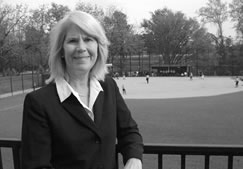 |
Mentor more than 400 student-athletes annually and serve as advisor to the Student-Athlete Advisory Council. Oversee Sports Communications, coordinate several special events, attend home contests along with several postseason competitions. Responsible for professional staff and programming for Recreation, Fitness and Wellness activities at GW’s Lerner Health and Wellness Center. What do you consider your biggest accomplishment at GW? Being part of the tremendous growth and success of GW’s 22 men’s and women’s sports as they continue to improve and achieve Atlantic 10 Conference honors and national recognition. We’ve been able to attract top student-athletes who excel both athletically, and academically, and meet expectations of excellence as “the bar” is set higher each year. |
|||||||||||||||||||||||||||
Mary Jo Warner, senior associate director of athletics and recreation/senior woman administrator |
||||||||||||||||||||||||||||
| Marva Gumbs, executive director, Career & Cooperative Education Years at GW: 20 Responsibilities: Manage a comprehensive, centralized career center with a staff of 22 professionals and provide strategic direction and leadership in the critical areas of Career Education, Employer Services, Experiential Education and Student Employment. Oversee program and project planning and implementation, technology changes, budget, and staffing. Serve as the Center liaison with University leaders. What do you consider your biggest accomplishment at GW? Three things: bringing visibility to GW by serving in leadership roles in several professional associations, hiring great staff members, and reorganizing the department. What do you find most satisfying about your job? The variety of tasks and functions that allow me to work with students, faculty, employers, administrators, etc. I wear several ‘hats’ and truly appreciate my revolving functions. Challenges: Juggling resources and struggling to capture the attention of the students in this urban fast-paced environment. |
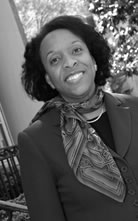 |
|||||||||||||||||||||||||||
| Chris M. Kormis, executive director of University Relations Years at GW: 15 Responsibilities: Management of the Office of University Relations, including Media Relations, ByGeorge!, GW Magazine, GW Advertising, GW News Center, Publications, and GW Graphic Design and Printing Services, as well as serve on the crisis communications team and chair the Internal Communications Committee. What do you find most challenging about your job? Our successes have led to increased requests for our services, and we try to accommodate as many as possible, but in some ways we’re victims of our own successes |
 |
|||||||||||||||||||||||||||
| Deborah Valdez Snelgrove, executive director for Student and Academic Support Services Communication and Technology Years at GW: 16 Responsibilities: Everything that brands the GW student experience: marketing the more than 30 student service areas to current, prospective, and graduate students as well as to parents and other priority GW constituents such as Colonials season ticket holders or GW Summer Tour camp participants; communications, creative services, and electronic communication initiatives of SASS COMM TECH; support the strategic recruitment, retention, and customer service efforts of the entire division; and, recently co-chaired the development of GW’s strategic Web presence. What do you consider your biggest accomplishment at GW? Coming up with the GW brand messaging that has successfully demonstrated staying power and has transcended my wildest expectations of permeating the entire GW culture. They include: “Something Happens Here,” “Colonial Inauguration (CI),”and “The Colonial Cabinet.” For me, they represent in the marketing world, my efforts at a Nike swoosh! I am more proud of these buzz-words than my four Addys for GW marketing campaigns and publications. |
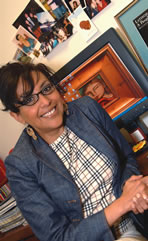 |
|||||||||||||||||||||||||||
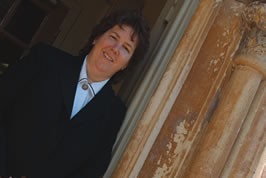 |
Also provides services to the Virginia Campus and the University’s other satellite locations such as Alexandria, Arlington, Hampton Roads, such as assistance with compliance issues relating to the Jean Clery Disclosure of Campus Security Policy and Campus Crime Statistics Act. What do you consider your biggest accomplishment at GW? When I came to GW I was one of the youngest police chiefs in the country… and I was female in a male dominated business. The key to my earning the respect of the officers in the department was people getting to know me and realizing that I had the knowledge and skills to lead this department at a time when the department was in need of some serious reform. Respect is a funny thing, you can’t demand it, you have to earn it. … |
|||||||||||||||||||||||||||
Dolores Stafford, chief, University Police |
||||||||||||||||||||||||||||